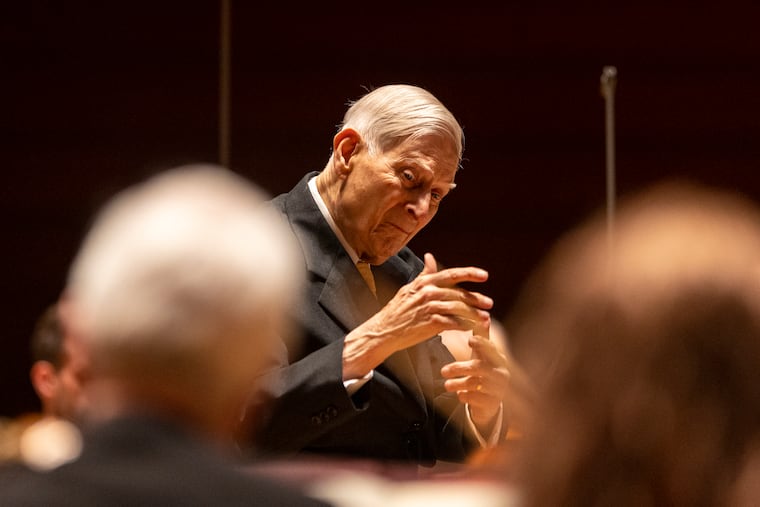He might be the oldest conductor to lead the Philadelphia Orchestra. And at 95, Herbert Blomstedt is having a musical spring.
Mozart, with just 40 players, was paired with a monumental and memorable Bruckner.

Not many concerts over the years have continued to echo within me the way Friday afternoon’s Philadelphia Orchestra concert has. Entire sections of the Bruckner played back in my mind through the night. A particular flute-bassoon sonority from the Mozart piano concerto was still present the next morning. And the mental snapshot of Herbert Blomstedt standing rapt in the doorway offstage as pianist Emanuel Ax played an encore seemed to capture the entirety of what a life in music has meant to this conductor.
If I was projecting, I don’t think I was the only one. There was something unmistakably personal about the entire concert. It was lost on no one that this might have been a singular event. Blomstedt is 95. The orchestra doesn’t keep track of the ages of those who lead it, but it seems likely that he’s the oldest conductor to ever step onto its podium.
If the afternoon started with an expectation of charitable listening, it was soon clear that no allowances were necessary. The orchestra has matched this level of polish and assurance only a handful of times in the last few years. Blomstedt used a companion’s arm to walk out on stage and opted to sit rather than stand while conducting. Deploying minimalist gestures with long, expressive fingers, he was in total control. It was an astonishingly beautiful concert.
The conductor — born in Springfield, Mass., and educated here and in Europe — has been on a valedictory tour that started years ago and shows no signs of slowing. He recently led the New York Philharmonic and San Francisco Symphony (where he was once music director), and the Chicago Symphony Orchestra is on the schedule this coming week.
His particular brand of alchemy isn’t complicated. He exudes an authority that puts the players at ease, and they, in turn, give him their best. You could hear the dynamic playing out over and over again Friday.
Polish and authority are impressive qualities, but it’s the emotion that Blomstedt and the orchestra pulled from two standard works that made it all so meaningful. The orchestra was shrunk to 40 players for Mozart’s Piano Concerto No. 18, and the sound did that funny thing that happens in Verizon Hall when there are fewer players on stage: It bloomed. Ax was his usual tasteful, insightful self — elegant above all. Blomstedt was about clarity and precision and a smooth, legato approach. The pianist was particularly moving in the encore, Liszt’s transcription of the “Ständchen” from Schubert’s Schwanengesang, where he found a gauzy piano color in the figures that echoed the melody.
At one point in Bruckner’s Symphony No. 4 (“Romantic”), Blomstedt lowered his hand so low in his lap it seemed impossible that the musicians could have seen what he was asking for. And yet, whether he conveyed his wishes through telepathy or had done so already in rehearsal, the conductor elicited great drama. Monumental, of course, is what Bruckner is noted for. But this was an interpretation that also found the crevices, especially in the first and last movements, with music that was in turns proud, perilous, and tranquil.
Blomstedt solved a few questions about the work itself. The middle section of the “Scherzo” is so different in mood from the rest of the movement it can feel disconnected. That’s a contrast to be accentuated, Blomstedt answered. He made the center part so slow and calm it felt like an oasis. When the opening material returned softly, it was the cavalry arriving in the distance.
Bruckner was a religious man, and if he intended his second movement to have the feel of a pilgrim on a journey, Blomstedt suggested for it a layer of emotional specificity — a path lonely at times, but girded by faith. You didn’t need to be religious to hear this stretch as perhaps the conductor’s most deeply felt statement of the concert. Who Blomstedt is was laid bare, poignantly so.
Additional performance: Sunday at 2 p.m. in Verizon Hall, Broad and Spruce Streets. Tickets are $10-$168. philorch.org, 215-893-1999.